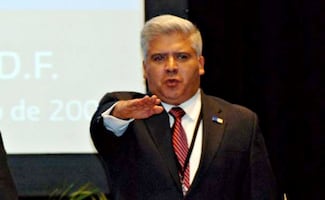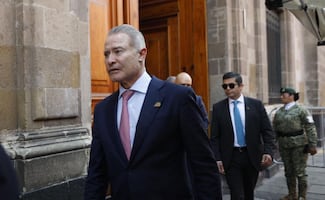Más Información

Morena se deslinda de dichos de vocera de su partido en la CDMX; narco es uno de los principales empleadores en México, dijo

Tras 17 horas, autoridades venezolanas liberan a periodista mexicano Julián Mazoy; “por ahora estoy bien”, dice

Suman tres exfuncionarios de García Luna detenidos, acusados en presunta red de lavado; así operaban

Operativo “Cisne Negro”, túneles y una película frustrada; así narró EL UNIVERSAL la recaptura de “El Chapo” hace 10 años

Desfile de embajadores y diplomáticos en Palacio Nacional; Quirino, Tatiana Clouthier, Genaro Lozano y Rutilio, entre ellos

Redadas, tiroteos y muerte de migrantes en Estados Unidos; los casos que exhiben el lado oscuro del ICE
A public recruitment drive by a Mexican drug cartel using fliers promising high wages and good benefits reflects the expanding power of the gang, experts said Friday.
The recruitment fliers advertised jobs as security guards or bodyguards under the name of a fake company, and promised good benefits, a Christmas bonus and "growth in the short term," according to Jesús Eduardo Almaguer, the chief prosecutor in western Jalisco state.
Those recruited were, however, employed as street-level drug dealers, not guards. They were sent to the town of Lagos de Moreno for a quick 10-day training course featuring paintball fights.
While prosecutors did not name the gang, experts said Friday it is without doubt the Jalisco New Generation Cartel.
Almaguer tried to depict the recruitment as a sign of the success of government raids against the gang. Speaking of the recruits - about a dozen were arrested earlier this week - Almaguer said "these people said they had been taken to Lagos de Moreno to substitute for people who had been retiring, or who had been fleeing from government raids."
However, Hope said the recruitment reflected how openly the gang dared to act. "This speaks of the impunity, of their operating almost openly," said Alejandro Hope, a security analyst in Mexico City.
Raul Benítez, a security specialist who teaches political science at the National Autonomous University of Mexico, said the Jalisco cartel, far from on the ropes, is clearly expanding.
"They are penetrating all the areas where the Knights Templar and Sinaloa cartel are leaving a vacuum," Benítez said.
"Sinaloa is leaving the area because of (the arrest of) El Chapo," Benítez said, referring to drug lord Joaquín Guzmán, captured in January. Jalisco "is the only cartel that can be said to be in expansion."
In the past, Almaguer said that "normally what was done was recruiting through friends or acquaintances. Now they are doing it openly, deceiving people, obviously, but openly."
In 2008, a cartel in the border city of Ciudad Juárez placed newspaper ads for drivers who were unwittingly used as drug couriers. But in the intervening years, no cartel had advertised openly for recruits.
Almaguer said a U.S. woman led the effort to hand out fliers on the streets of Jalisco cities like the beach resort of Puerto Vallarta. The U.S. embassy could not confirm the name of the woman, but did say it was aware of reports that a U.S. citizen has been arrested in Jalisco.
After recruiting the people - many of whom had previously worked as informal parking valets or cleaning motorists' windshields at stoplights - they were told they had to sell methamphetamines and other drugs.
The plan was discovered after one of the recruits tried to back out of the scheme, and was kidnapped and held by the gang, who demanded a ransom of 1 million pesos (US$55,500). His family called authorities.
The recruitment fliers themselves played on the recruits hope for advancement. It listed as requirements "initiative and desire to advance," and offered a salary of about 3,000 pesos (US$166) a week. Tellingly, the flier listed "ability with guns" as a requirement, and hinted that "if you are an ex-government employee, or ex-policeman, traffic officer, detective or ex-soldier... the salary is higher."
Noticias según tus intereses
[Publicidad]
[Publicidad]








